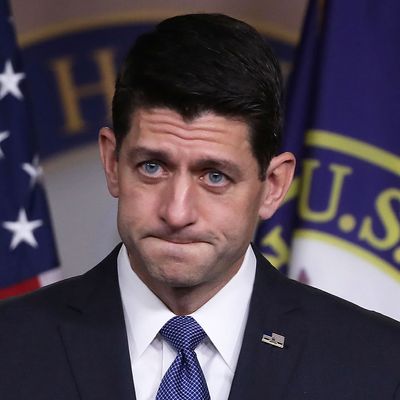
Just before Christmas, every Republican Senator (who wasn’t sidelined by illness) voted for the most unpopular tax bill in modern American history. In the House, all but 12 Republicans did the same.
Paul Ryan and Mitch McConnell have drawn very different conclusions from this development. The House Speaker sees a party with the courage (and/or contempt for their constituents) to buck public opinion and slash food and medical aid to the poor and elderly. McConnell, meanwhile, sees a Senate caucus that has already paid its dues to the conservative donor class — and shouldn’t have to take another tough vote until after the 2018 midterms.
The Senate Majority Leader made his position public last week. “The sensitivity of entitlements is such that you almost have to have a bipartisan agreement in order to achieve a result,” McConnell told reporters at a press conference, further saying that he “would not expect to see” welfare reforms of any kind next year.
As Ed Kilgore has noted, McConnell’s break with Ryan here can be read as a product of their divergent governing philosophies. The Majority Leader is a bit more keen on power for power’s sake — and thus, a bit less willing to sacrifice it on the altar of conservative dogma — than his counterpart in the House.
But a new report from Politico suggests McConnell’s opposition might be rooted in basic math. Once Democrat Doug Jones takes his Senate seat in January, McConnell will have only 51 GOP votes in the upper chamber — which is to say, any two Republican senators will be able to kill partisan legislation that displeases them. Given that Susan Collins and Lisa Murkowski were unwilling to cut Obamacare earlier this year — at the time, one of the least-popular safety-net programs in the U.S. — it seems doubtful that they’ll be interested in slashing overwhelmingly popular programs like Medicare, Medicaid, and food stamps. And Republican opposition to taking from the poor (immediately after giving to the rich) isn’t limited to “moderates”:
Sen. Shelley Moore Capito (R-W.Va.), a swing vote during the Obamacare repeal fight this summer, quickly changed the subject when asked about Ryan’s entitlement reform push.
“Well, I’d like to see us pivot to infrastructure. We’ve talked it all year, the president talked about it,” Capito said. “I think it could be a bipartisan exercise. I would certainly hope so.”
… “All you have to do is the math,” Senate Majority Whip John Cornyn (R-Texas) said. “Unless it’s bipartisan, then you’re talking about reconciliation which means you have to pass a budget, you have to get reconciliation instructions and you have to get 51 Republicans all to vote for it.”
The No. 2 Senate Republican added: “That’s a pretty steep hill to climb.”
…“We’re going to have a narrow majority next year,” said Colorado Sen. Cory Gardner, chairman of the National Republican Senatorial Committee, about an entitlements fight. “We’re going to have our hands full with nominations and an infrastructure bill and a bipartisan agenda.”
Voting for unpopular tax cuts for the wealthy was one thing; following it up with cuts to popular programs that serve the lower-middle class and indigent is quite another. In the immediate term, the tax bill hurts relatively few people. Even its most destructive provision — the repeal of Obamacare’s individual mandate — is unlikely to harm the program’s most vulnerable enrollees. And those who will see their taxes go up in 2018 won’t have heartrending stories to tell — no children will go hungry because their parents can only deduct $10,000 of property taxes from their federal liability.
But tearing holes in America’s (already threadbare) safety net would kill people. In a Wall Street Journal op-ed last week, Paul Ryan lamented the decline of our nation’s middle class, noting, “Nearly 8 in 10 Americans live paycheck-to-paycheck; nearly half say a $500 surprise bill or emergency would put them in debt.”
Ryan might be able to summon the cognitive dissonance necessary to acknowledge these realities while pushing to make emergencies even more financially ruinous for low-income people. But many of his Senate colleagues can’t. Capito’s remarks are especially telling. The West Virginia senator voted for Obamacare repeal, despite the fact that the bill would have hammered her predominantly working-class state. After voting for the Trump tax cuts, however, she appears to have lost her nerve.
Congressional Republicans are desperate to counter the impression that their signature piece of legislation was a giveaway to the rich. Ryan’s welfare scheme is antithetical to that task. It would force GOP lawmakers to argue that the growing deficit requires shared sacrifice — right after their tax bill swelled that deficit by $1.5 trillion.
It’s not surprising that Senate Republicans have little interest in such a gambit. And infrastructure looks dead on arrival for other reasons. Given these realities — and the Democrats enormous lead in polls of the 2018 congressional race — president Trump’s first major legislative achievement could very well be his last.






























